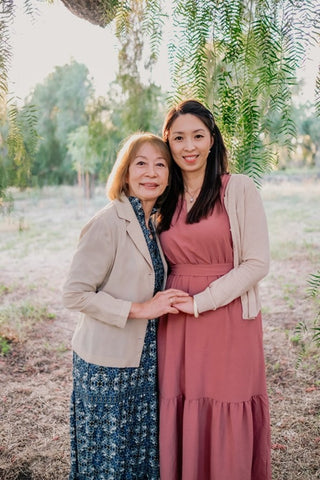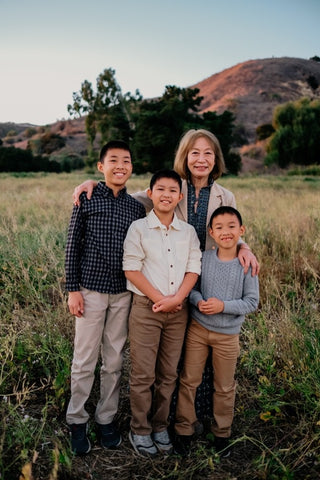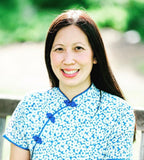Embracing Praise and Affirmation: Overcoming Cultural Barriers from My Taiwanese Roots
On a cool December evening, my friend Jennifer invited me and my family to her home for dinner. We sat outdoors in the community pool area as an older Asian lady walked toward the gate door. I didn’t recognize her at first as the sky getting dark. As she came closer to the gate door, I realized it was Jennifer’s mother.
Jennifer’s mother also known as AhMa to her grandsons greeted me with, “Jennifer 準備很多,她成天很忙.” Jennifer prepared a lot; she was so busy the whole day.
“是的,是的,她煮很多,” I replied. Yes, yes, she did cook a lot.
Hmm… Something felt odd and was making me feel slightly uneasy, but I didn’t know what it was.
Receiving & Giving Praise
Later while we were eating dinner, AhMa pointed out more than twice about how delicious the food was, praising Jennifer for how she was able to provide such a wide variety in a short time and able to make it all so tasty. “很好吃!”Everything is so delicious. How were you able to make all this? It must have taken you all day. You cut up all that avocado? I wouldn’t be able to cut up so much avocado.”
Ohh! I realized what was causing me some discomfort. It was because Jennifer’s mom is really nice… not just nice as a formality to strangers and people outside her family. AhMa is being kind and supportive of her own daughter. She is actually verbally and directly praising her in front of other people like me.


Above photos- Top: Jennifer with her mom; Bottom: AhMa and her three grandsons.
Overcoming Cultural Barriers
I was not accustomed to hearing Chinese or Taiwanese elderly mothers praising their adult children. Let alone younger Chinese mothers praising their children directly in front of other people. Growing up as a Taiwanese American child in Los Angeles, I can’t remember my parents ever directly praising me to my face, that is, telling me things like “good job” or “you are amazing.” My Asian not-wanting-to-brag-and-seem-too-proud side is preventing me from giving specific positive hypothetical examples of what my parents could have said to me.
Why don’t Chinese parents praise their children directly? Why don’t they tell their kids sentiments like, “you are smart,” “you are kind,” “you are beautiful?” Why can’t they say “good job” to their children?
Sadly, my parents never said these statements to me. They never said the words, “I love you,” “thank you,” or “I’m sorry.” (As my mother grew wiser in years and in her faith, she did come to say “I’m sorry,” and “thank you,” to me personally when I became an adult.) It was still difficult to say “I love you,” verbally, but let’s save that conversation for another day.
My mother might praise me and say things like, “Christina is a good daughter,” to her friend or a relative. Again, the Asian side of me is preventing me from giving specific examples that will seem like bragging. My mother’s praises may be said within earshot of me, but they were never meant for me to respond to. She would never say to me directly, “You are a good daughter, Christina.”
Embracing Praise & Affirmation
As a child, it would have been a huge encouragement to hear my parents’ praises and to have their positive affirmations that I was unique, I was beautiful, I was loved. Now as an adult, I have learned to forgive them for their lack of praises and what I thought was lack of love. I’ve learned that we all express our love differently and sometimes not through direct verbal affirmations. I have learned not to put my identity, confidence, and self-worth in my family’s words and opinion of who I am.
So this is why I was feeling uneasy. It is so unheard of, so unique for a parent of Chinese, Taiwanese, or East Asian descent, to praise their child directly, much less in front of anyone outside of the family. We certainly felt loved and welcomed as Jennifer prepared many dishes including allergy-friendly food for my kids. To see AhMa praising her daughter to her and in front of other people is refreshing and inspiring. Let us learn from this AhMa and do the same to our own children and the loved ones in our lives.
Growing up, did your parents praise you? How has their praise or lack of praise affected how you treat and affirm your own children?
----------------
About our guest blogger

Christina C. Wu 張玉蒓 grew up in San Gabriel Valley (SGV), California and spent childhood summers at her grandparents’ home in Taiwan. After receiving an M.A. in School Counseling from NYU, Christina worked several years in New York, counseling Chinese-speaking families in the non-profit sector. Christina’s childhood experiences, along with her two homeschooled children’s experiences, are the inspiration for her first book, AhMa Loves You! The author's first language is Taiwanese, and her love language is quality time - enjoying “me time” and spending time with those she loves.
You can find her on IG: @empressxtina3 or at her website: www.authorchristinawu.com
